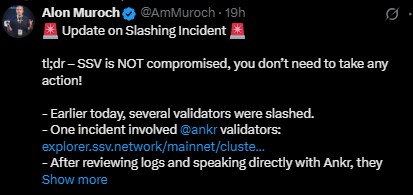Was SSV Labs Really Compromised or Is It Just Validator Mismanagement?
Recent rumors about a security breach at SSV Labs shook the staking community, but the team has now clarified that the network itself is safe. The panic started after multiple Ethereum validators running on the SSV Network were slashed this week. Many feared this meant the distributed validator protocol had failed — but CEO Alon Muroch says otherwise .
 Source: X
Source: X
What Actually Happened Behind the Scenes
On September 10, 2025, its monitoring systems detected two separate slashing events. The first affected just one validator at 11:51 UTC. About 90 minutes later, a second and much larger incident hit a cluster of 39 validators. These were operated by Ankr and had recently migrated from Allnodes.
Fears quickly rose that something inside protocol was broken. However, the post-mortem from the team tells a different story. Logs showed no signs of double-signing or malfunction within its infrastructure. Instead, both incidents were traced to external key management mistakes .
 Source: X
Source: X
-
In the smaller incident, one showed a double-signing error on the Beaconcha.in tracker, but its own logs showed only one signature, proving it didn’t come from SSV.
-
In the larger cluster case, Ankr admitted their internal maintenance caused validator keys to run simultaneously on two separate systems — one inside and one outside — which triggered automatic slashing.
Muroch emphasized that SSV Labs is not compromised , and operators or stakers don’t need to take any action. The problem was purely operational, not protocol-level.
Why This Matters for the Crypto Community
The incident highlights a critical lesson about validator safety: validator keys must stay in a single trusted setup . SSV’s distributed validator technology (DVT) works by splitting a validator’s private key across several independent operators. This design reduces downtime and prevents double-signing, which can cause slashing.
But if operators run those keys outside — even by accident — these protections no longer work. The team also noted the importance of slashing protection tools, especially during maintenance or migrations, to avoid accidental double-signing.
Such missteps can have real costs. While the affected validators will lose funds from penalties, the core infrastructure remains stable and secure . Community cooperation also played a big role — Ankr quickly shut down its affected nodes and worked with SSV to confirm the root cause.
Crypto Hacks Are Rising — Is Crypto Still Safe?
This scare comes as the crypto industry faces a wave of real security breaches. The Nemo Protocol recently lost $2.59 million in a breach (though the team said no customer funds were harmed). Bybit lost more than $1.5 billion, WazirX lost around $230 million, and CoinDCX was hacked for $44 million.
These incidents indicate how exchanges, protocols, and platforms are being increasingly targeted by attackers, and it's worrying the security of the digital assets overall.
Conclusion
Although these slashing attacks were alarming, they were not the result of a protocol bug. The network is secure, and nothing needs to be done by stakers or operators. But the incident reminds us that bad key management is worse than a crypto hack — and during the current climate of constant crypto break-ins, good ops security is more important than ever.
免责声明:本文章仅代表作者个人观点,不代表本平台的立场和观点。本文章仅供信息分享,不构成对任何人的任何投资建议。用户与作者之间的任何争议,与本平台无关。如网页中刊载的文章或图片涉及侵权,请提供相关的权利证明和身份证明发送邮件到support@aicoin.com,本平台相关工作人员将会进行核查。



